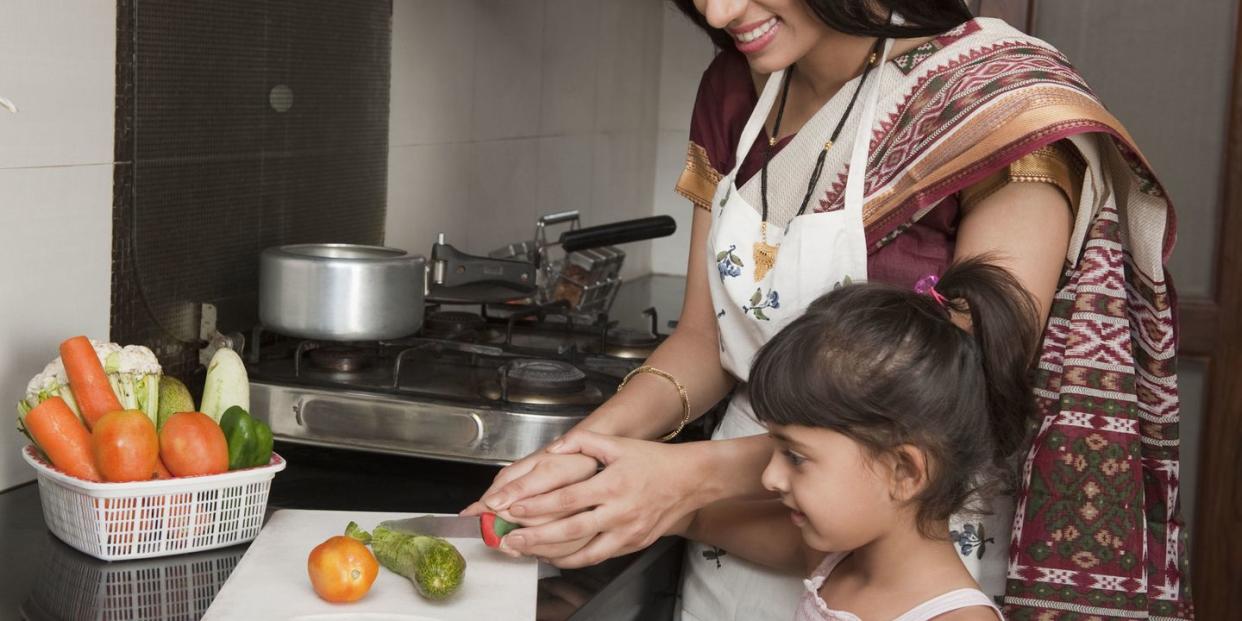How Cooking With My Mom as a Child Made Me a Better Parent

One of my clearest memories from growing up in India is cooking pakoras—vegetable fritters in a lentil batter—with my mother on monsoon afternoons, the rain drumming on the roof, the lightning zigzagging close to our windows. They were the comfort food that made me appreciate having a home where I was loved and protected.
Pakora-making was an elaborate process because my mother didn't believe in shortcuts. Maybe she was always like this, but I noticed it after my father left us. Perhaps she believed that teaching me to do things the "honorable" way would help me succeed in a society that viewed a household without a father as shameful.
So first, we soaked the lentils overnight, then ground them into a batter. I measured out red chili, cumin, and coriander powders, and beat them into the batter until they disappeared. I sliced potatoes, red onions, and Indian pumpkin, and when the oil was the right temperature, I dipped the vegetables in the batter, then dropped them into the oil, letting them turn golden. If I made a mistake, I heard about it at length, because my mother wanted me to demand perfection of myself. She thought praise made children soft, unable to handle the difficulties of the world. After cooking, I alone had to clean the kitchen pristinely.
The delicious, crunchy results were well worth all this trouble. But what I loved best about pakora-making were the stories my mother would tell as we cooked, mostly about her mother, who had died before I was born. She had been a fine needlewoman, and my mother loved describing the quilts she had made.
Food. It's how we pass on so much to our children: culture, memories, ways of being in the world.
I came to America as a college student and absorbed many of its individualistic values, in the process dropping much of my upbringing. I married a man whom I chose myself. I continued to work after my two sons were born. But when they got old enough, I decided to teach them how to make pakoras. I wanted to share the memory of a time when my mother and I had enjoyed a simple happiness.
In many ways our pakora-making is different. I buy lentil flour from the Indian grocery. More health-conscious, I use spinach and drain the pakoras on paper towels. But we sprinkle in the same spices, and when we fry the pakoras, that old delicious smell fills my kitchen.
Along with the recipe, I've modified my mother's parenting lessons. In cooking and elsewhere, I've taught my sons to take intelligent shortcuts where possible. When they make mistakes, I point them out, but I also lavish them with praise. If they create a mess, they have to clean it up, but I always lend a hand. And when we cook, I tell them stories about my mother, that fierce, brave woman who raised her children in a country where single motherhood wasn't the norm.
I know my parenting style has its shortcomings. My children often handle life's problems less stoically than I did as a child. Sometimes I wonder if they're pushing themselves enough. Then I think of those pakora-making sessions, my sons' happy cheeks pressed against mine, and I'm comforted. Because that's the most important thing my mother taught me: Mingle stories and memories with love and learning. That's what really nourishes you. What makes you strong.
Chitra Divakaruni's new novel is Before We Visit the Goddess.
You Might Also Like

